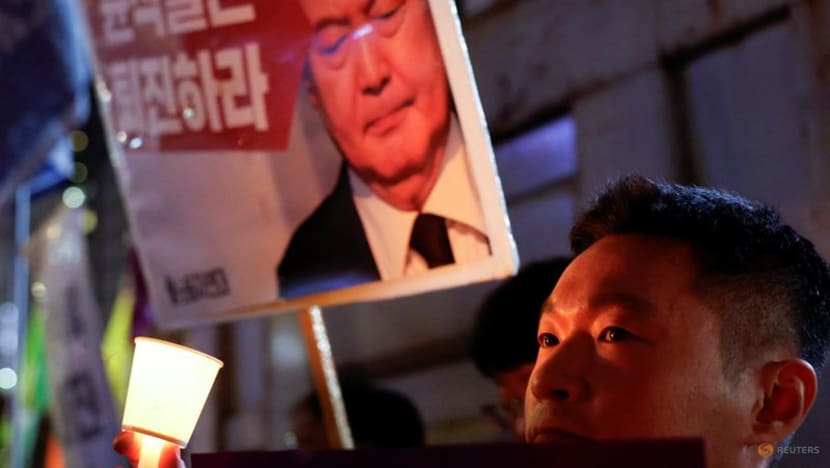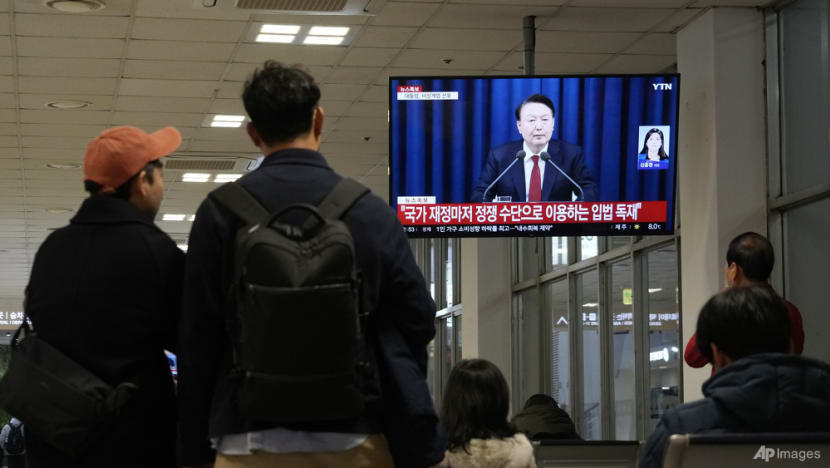South Korea’s Yoon unlikely to resign even as impeachment looms: Analysts
Observers said the prosecutor-turned-politican’s legal background will come into play when Yoon fights an impending impeachment following his short-lived declaration of martial law.


This audio is generated by an AI tool.
South Korean President Yoon Suk Yeol's political fate is hanging in the balance as criticism and anger mount over his botched attempt to impose martial law.
But even as thousands march along the streets of Seoul demanding his resignation, analysts have expressed scepticism that the embattled president will leave office on his own accord.
Political science professor Yong-Chool Ha said that Yoon likely believed he abided by the book in his short-lived martial law declaration on Tuesday (Dec 3). An emergency vote in parliament in the early hours of Wednesday forced him to reverse his decision.
“Yoon is a peculiar individual. He (believes) everything should be done legally. He might have thought that he strictly followed the rules, even this time,” said Ha, who is the director of the University of Washington’s Center for Korea Studies.
“So, it's very unlikely Yoon would accept his mistake.”
With most observers believing a leadership change is now inevitable, Ha said Yoon would most likely be removed from power through impeachment.
“The court (proceedings) will last several months but I'm sure Yoon would not mind being engaged in prolonged legal battles,” he added, pointing to the lawyer-turned-president’s legal background. Yoon spent 27 years as a prosecutor before running for South Korea’s presidency.
Sung-yoon Lee, a global fellow at Washington-based think tank Woodrow Wilson International Center for Scholars, agreed that Yoon looks unlikely to step down, adding he expects the 63-year-old to fight the impeachment.
IMPEACHMENT IN MOTION
Six opposition parties have filed an impeachment motion against Yoon, arguing his martial law declaration violated the constitution. It is led by the main opposition Democratic Party, whose leader called Yoon’s failed bid a “coup attempt”.
Voting on the motion is expected to take place on Saturday, according to Yonhap news agency.
A two-thirds majority is required to pass the motion, which would need support from at least eight lawmakers of Yoon’s ruling People Power Party (PPP).
PPP leader Han Dong-hoon has vowed to unite the party and block the motion's passage. He said the move is not an effort to defend Yoon but instead, to prevent “unprepared chaos to the public”.
He reiterated his call for the president to leave the party, adding Yoon must be “held strictly accountable” for his actions.
Lee, who is a former Korean Studies professor, pointed out that South Korea’s nine-member Constitutional Court makes the final decision on the impeachment.
Currently, there are only six judges on the bench, four of whom were appointed by Yoon, which could complicate the process.
WHY DID YOON TAKE THE GAMBLE?
Lee said Yoon likely believed he had enough supporters who would back his controversial decision, but his gambit backfired.
In his statement declaring martial law, Yoon insisted it was the only recourse he could take to salvage the nation against what he called enemies of the state, anti-state activities, and pro-North Korean sympathisers.
However, he gave no evidence of his claims and was forced to backtrack just hours later, after lawmakers – including 18 from his own party – voted to lift the order.
“It's an own goal, an unforced error that has put his political career, his supporters and his party at great risk,” Lee told CNA938.
Yoon has been a lame duck president since the ruling party’s crushing defeat in the general election in April this year.
With an opposition-dominated parliament, his government has not been able to pass the laws they want, including Yoon’s proposed budget bill.
Lee said Yoon’s failed mandate has “rendered him an even wobblier lame duck”.
He is also facing scandals involving his wife Kim Keon-hee, who has been accused of corruption and influence peddling.
WHY ARE SOUTH KOREANS ANGRY?
South Korea has a dark history with military dictatorships that spanned nearly three decades, marred by brutality and repression.
The nation is a relatively young democracy, with its first democratically-elected president taking office in 1988.
Analysts say South Koreans are proud of the long way their nation has come, and view Yoon’s move as a regression of their hard-won democracy.
“(This) in South Korea, conjures up … images of tanks rolling over people, soldiers firing on unarmed civilians, arbitrary arrests and even torture,” said Lee.
“So, the prevalent view in South Korea … is that this is quite a setback, politically speaking, and it’s an affront on the collective psyche of the nation.”
HOW ITS FRIENDS AND FOES VIEW THE CRISIS
Lee said that despite Yoon’s record low approval ratings from the South Korean public – which was already hovering around 20 per cent even before his martial law attempt – the president has relatively good international standing, particularly with the United States, Europe and Japan.

“Yoon is perceived as having done very well in terms of mending fences with Japan and galvanising the US-led alliance system in the Indo-Pacific,” said Lee.
“The latest developments are a major shock and a source of disappointment for the US and other democracies around the world.”
Analysts said North Korea is expected to soon set its propaganda machine in gear. The two Koreas are technically still at war and their ties have fluctuated through different leaderships.
Yoon has long maintained a hard line against the North, while Pyongyang has “vigorously vilified Yoon” since he took the reins more than two years ago, said Lee.
“It would be atypical of North Korea to let this spectacular crisis in South Korea and Yoon go to waste,” he said.
“I expect North Korea to be more assertive and provocative … and blame Yoon for his own hostile policies towards … his own nation and his own people. That kind of rhetoric might resonate throughout much of South Korea as well.”

















